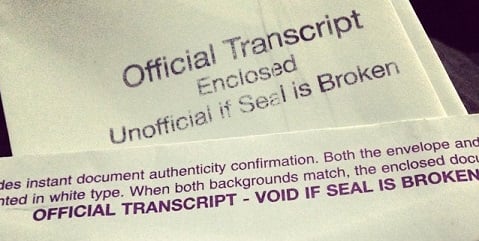
You've probably heard of high school transcripts, but do you know what information they contain and why they're so important for applying to college?
This guide will explain what a high school transcript is, what exactly it includes, and why it is often the most important part of your college application.
What Is a High School Transcript?
A high school transcript is basically a record of your academic accomplishments in high school. It lists every class you took, when you took them, and the grade you received in each class, sometimes along with additional information such as standardized test scores and any honors you received. Every person enrolled in high school has a high school transcript, which is regularly updated as courses are completed.
There are two versions of your high school transcript: official and unofficial. The two versions will usually look very similar or identical in terms of content, but an official transcript will often have a seal or tamper-proof marks on it or will be inside a sealed envelope. This is so people reading the official transcript can be certain no changes were made to it after it was released by the school and that the information it contains is 100% accurate.
Official transcripts often have to be sent directly to by your high school in order to remain official, while a transcript you print or copy yourself will be unofficial. Most colleges require you to submit an official copy of your high school transcript when you apply, but if you just want to look at the information your transcript includes for your own personal use, an unofficial copy is fine.
Why Do You Need a High School Transcript?
So now you know what a high school transcript is, but why is it so important? High school transcripts are needed for several reasons:
#1: To Apply to College
Your high school transcript is probably the most important part of your college application, simply because it contains so much information about you: the classes you took, when you took them, how well you did in them, etc. Colleges will look over your transcript very carefully when you apply, so it's important to understand what they'll be looking for, which we'll cover in the next section.
#2: To Graduate High School or Transfer to a New High School
Before you head off to college, you, of course, need to finish high school, and your transcript will be what your high school looks at to see if you can graduate. They will look to make sure you took enough credits, completed each of the graduation requirements, and passed the necessary classes. If you transfer high schools, your new school will use your transcript to determine the classes you completed and which classes you should enroll in. When changing schools, you will have a transcript from each high school you attended, but your new school will also include information about the classes you took at your previous school, usually marking those classes as transfer credits.
#3: To Apply for Jobs
Some jobs require you to submit your high school transcript when you apply so they can look at your grades or make sure you have taken any classes they may require workers to have passed.

Grab a copy of your transcript and find the specific information mentioned as you read through the next part of this guide. If you don't already have a copy of your transcript, ask your guidance counselor for one, or if you need more assistance, take a look at our guide to learn how to get your high school transcript.
What a High School Transcript Includes
Transcripts contain a lot of information, and at first glance it can be difficult to take it all in. This section will explain what a transcript includes, why this information is important, and ways for you to determine if you're on track for creating a strong one. The main components of a transcript are:
The Name of Each Course You Took in High School
Your transcript will list the course name for each class you took in high school, including whether you retook or dropped a class.
Why Is This Important?
- This information is used to determine if you met graduation requirements for your high school as well as the entrance requirements for colleges.
- It shows the difficulty of your schedule, such as whether you took a lot of honors and AP classes or mostly stuck to regular-level courses.
- It shows the subjects you the most classes in. This is important because if you're applying to college and indicate you plan to major in, for example, biology, colleges will expect to see a fair number of science courses on your transcript.
Questions to Ask Yourself:
- Are you on track to meet your high school’s graduation requirements?
- What about entrance requirements for colleges you are interested in?
- Have you or will you be taking classes in the subject you plan to study in college?
Actions to Take:
- Talk to your guidance counselor if you’re unsure about graduation requirements.
- Research different colleges to see the classes they require students to have completed in high school, and make sure those classes are on your transcript or will be before you graduate.
- If you don’t feel like your transcript includes enough courses in the subject you want to study in college, aim to take more classes in that field before you graduate.
The Grades You Got in Each Class
As well as providing the letter grade you got in each class you took, transcripts will also often include your GPA (weighted and unweighted) as well as your class rank, if your school has this.
Why Is This Important?
- It shows schools and employers how well you grasped the material in each of your classes and how well you can be expected to do in future classes. This is very important information to colleges because they want to accept students they feel will succeed in college classes.
- It allows colleges to compare your grades and GPA to other applicants and their school's average entrance GPA.
- Colleges often pay special attention to your grades that relate most closely to the subject you plan to major in.
- Class rank shows how well you did academically compared to the rest of your graduating class.
Questions to Ask Yourself:
- Is your GPA close to the average entrance GPAs of the colleges you're interested in?
- If you know what you will major in, do you have strong grades in the classes that relate to that subject?
Actions to Take:
- Find specific colleges’ average entrance GPA on their websites, and see how your current GPA compares.
- If you’re looking to improve your GPA (and it’s never too late to do so!) we have a guide for that (as well as a specialized guide on how to do raise your GPA swiftly)!
- If you want to improve your grades, concentrate particularly closely on the classes that relate most to your future major.

When You Took Each Class
The classes on your transcript are organized by date, with the classes you took first at the top, and your most recent classes at the bottom. Classes are grouped together by semester/trimester/quarter, depending on your school's calendar.
Why Is This Important?
- It allows colleges to see the progression of your courses. Did you move from regular English your freshman year to honors English your sophomore year? Did you sign up only for easy classes your senior year? Colleges use that information to help determine whether or not you challenged yourself each year of high school.
- It lets colleges and others see if and how your grades changed over time. Did you stumble a bit at the beginning of high school, but managed to raise your GPA after that? Were there any semesters where your grades were significantly lower than other times?
Questions to Ask Yourself:
- Have you been continuously challenging yourself with the classes you take? Does your transcript show this (such as honors or AP classes)?
- Were there any periods in high school when you got lower grades than usual?
Actions to Take:
- Make sure you continue to take challenging classes throughout high school, even during senior year, including honors and AP classes if possible.
- If there was a period of time when your grades dropped, and you have an explanation for it (illness, personal issue, etc.) attach a note to your application describing the situation, and ask your guidance counselor to explain the situation in their letter of recommendation as well. Colleges can be very understanding about circumstances like that, especially if they see you made an effort to improve your grades afterward.
Behavior Record
Some transcripts contain information such as the number of absences you have had and any serious disciplinary actions you have faced (such as suspensions, not minor issues like detention).
Why Is This Important?
- Colleges and employers want to make sure they’re accepting people who are serious about their commitments and will get along well with others. If a student regularly didn’t show up for class or had a serious disciplinary action, they may be hesitant to accept or hire them.
Ask Yourself:
- Is there any evidence of discipline or frequent absences on your transcript?
Actions to Take:
- If the above applies to you, attach a letter to your application describing the situation and the ways you have worked to improve yourself since then. Be sure to avoid repeating the same mistakes.
Additional Information
Some high school transcripts contain additional information such as your scores for standardized tests, any honors or awards you received in school, and sometimes the volunteer work you did.
Why Is This Important?
- It provides more information about your accomplishments so schools and jobs can get a more complete picture of who you are.

What's Next?
Need to get ahold of your high school transcript? Learn how to get a copy of your transcript, regardless of when you graduated high school and which type of school you attended.
Wondering whether your GPA is good enough to get you into the colleges you want? Check out our guide to figure out how strong your GPA is.
Unsure of where you want to go to college? Learn how to choose the best college for you!
Want to improve your SAT score by 160 points or your ACT score by 4 points? We've written a guide for each test about the top 5 strategies you must be using to have a shot at improving your score. Download it for free now:
Have friends who also need help with test prep? Share this article!

Christine graduated from Michigan State University with degrees in Environmental Biology and Geography and received her Master's from Duke University. In high school she scored in the 99th percentile on the SAT and was named a National Merit Finalist. She has taught English and biology in several countries.



































 Holly R.
Holly R.